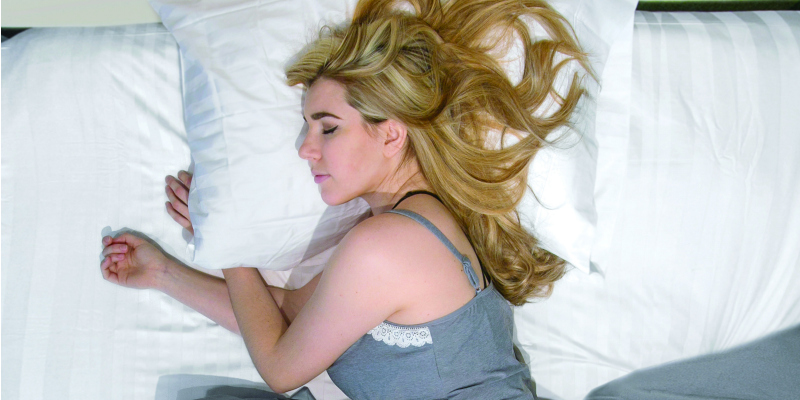Sleep, Precious Sleep
Why Are We So Tired - And What Can We Do About It?When Valerie Gonsalves of Madison was in graduate school, sleep was optional. Just a few hours a night became routine. She adapted.
“I knew it wasn’t the healthiest pattern,” she admits. “But it worked.”
Gonsalves’ approach is one that many of us have adopted in our world of always-on technology and increasingly demanding work schedules. According to Stephanie Jones, Ph.D., associate scientist and assistant director at Wisconsin Institute for Sleep and Consciousness at UW-Madison, the average American adult has reduced sleep by an hour-and-a-half per night since the 1970s. And according to the Centers for Disease Control and Prevention, an estimated 50 to 70 million U.S. adults have sleep or wakefulness disorders. “People are horrible reporters of their own sleepiness,” says Jones. “We will psychologically adapt to sleep loss and think, ‘I feel OK, my reaction time is good, I’m thinking as well as I should be.’”
But it’s not true, she warns. When you get used to feeling tired throughout the day, you’re no longer aware of how significant the sleep loss is and how impairing on the mind and body it can be. So why is sleep so important, and should we worry if we don’t get “enough” sleep?
Jones admits that the function and reason all organisms sleep is still a bit of a mystery, but the fact is all organisms do sleep, from animals to insects to humans, and evolution has not dispensed with it.
“I think most scientists would agree, sleep is for the brain,” says Jones. “The body can probably do with just rest, but the brain cannot.”
She explains a theory that regular sleep, especially non-REM sleep when brain waves are slow and synchronized, allows our brain to downscale the synapses that have been working hard all day to learn and store memories. These synapses use up a lot of resources like glucose. “It’s like a reset button,” she says of this deep sleep process. It prepares us for the next day to gather more information and feel alert and ready for the day.
Dr. Jacalyn Nelson, medical director of SSM St. Mary’s Sleep Medicine Department, says that sleep is also an active time for hormone release and balancing. And one of the most noticeable effects of not getting enough sleep is an imbalance of ghrelin, a hormone that makes us feel hungry, and leptin, a hormone that helps us feel full, or satiated.
“The ratio gets upset and reversed, and causes ghrelin to increase—making us feel hungry— especially for the things we shouldn’t eat like carbs and junk food,” Nelson says. This leads not only to weight gain, but also tiredness throughout the day.
Insulin resistance, glucose intolerance, diabetes, high blood pressure and high cholesterol are just a few of the other physiological risks of not getting regular deep sleep. Add in the emotional and mental impacts, such as decreased performance on the job, irritability, anxiety, and drowsiness when driving, and the value of sleep becomes clear. You might also find that your anxiety might be a reason that you can’t get a good night’s sleep. If this is the case then it might be worthwhile checking out something like Neoteric Nutra cbd oil, as cbd can help you get a better night’s sleep. Once you are finally back on track on getting a normal sleeping pattern you will find so much more better because of it.
“Sleep is actually a very active time. We like to think of sleep in our culture as being a waste of time, but that’s absolutely not true,” says Nelson.
Sometimes though, sleep just doesn’t come, or tiredness plagues us throughout the day. One of the most commonly reported reasons among women is insomnia. Some people believe that the Best Sad Light can help reduce insomnia.
Jones explains that insomnia is difficult to treat because it can be caused by an array of issues from psychiatric disorders such as anxiety or bipolar, to menstrual cycles, to aging. But a good place to start if you think you have insomnia is evaluating your sleep hygiene. Are you drinking alcohol or caffeine before bed? Are you on your phone or tablet within an hour of going to bed? If the answer is yes, it may be keeping you up at night.
Menstrual cycles can also wreak havoc on our sleep, says Jones. “Estrogen is the energy hormone, and progesterone is the sleepy hormone,” she explains. “So women will report insomnia in the few days before their menstrual period because progesterone plummets causing a disruption in sleep patterns.”
Both experts agree that improving sleep hygiene, meditation, breathing techniques and relaxation exercises can typically improve mild insomnia, but Cognitive Behavior Therapy is the front line of treatment for more severe cases.
Nelson explains that Cognitive Behavior Therapy for insomnia involves a series of visits with a clinical psychologist to review sleep patterns and evaluate for mental health issues like depression and anxiety.
“[The psychologist] also reviews the person’s beliefs and thoughts about sleep, which may not be serving them well, then puts into place a strategy to change that behavior,” she explains.
As Gonsalves began her post-doctorate work, she realized that her grad school sleep habits weren’t working anymore, but she couldn’t get her brain to stay asleep all night. Her doctor recommended a sleep study through the Wisconsin Sleep Center at UW Health, where Gonsalves was evaluated overnight for irregular sleep patterns. Nothing conclusive came out of the study, so Gonsalves decided to make sleep a bigger priority in her life.
She lists off the improvements to her sleep hygiene over the last few years, “My room is completely dark. I don’t have a television in my room, which I did before. I don’t drink any caffeine after 2 or 3 in the afternoon. I also keep a pretty regular sleep/wake schedule.”
But is it working? She says she still wakes up in the middle of the night, but now she doesn’t have a clock next to her bed, which used to make her anxious about how many more hours of sleep she has left. Regular exercise and avoiding carbohydrates at lunch are also tactics she focuses on when her sleep patterns are out of whack.
Often, women who complain of insomnia may also suffer from restless leg syndrome, which is an irresistible urge to move the limbs, especially the legs, and especially at night. Jones notes that the syndrome is commonly linked to low iron levels, yet another side effect of menstruation.
Fragmented sleep can be caused by other physical disorders as well, like obstructive sleep apnea, which occurs when the airway collapses or is obstructed during sleep. This restricts or stops breathing, preventing that delicious slow wave, non-REM sleep our brains crave.
Jones explains that although sleep apnea is often related to obesity—and men are twice as likely to have it as women—the rate of the disorder increases as women approach menopause, a time when sleep becomes more disrupted in general.
“It could be related to weight gain during menopause, or a decrease in estrogen,” says Jones. “Estrogen keeps our tissues rigid, so the decrease in hormones may just make our airways floppier, leading to sleep apnea.”
Typically, sleep apnea is diagnosed through a split-night sleep study in labs like those at UW Health and SSM St. Mary’s. Patients are evaluated through the first part of the night, and if diagnosed, a sleep technician fits them with a CPAP, a device that fits over the nose and blows the airway open during sleep. In milder cases, positional changes, like avoiding sleeping on the back, or an oral device fitted by a dentist can alleviate obstructive sleep apnea.
Jones is quick to note that the function and biology of sleep is still a bit of a mystery, but what is known is that sleep can vary naturally, due to genetics, age and brain chemistry. And the more we adapt to less sleep, the higher the risk of impacting our health. Listen to your body and treat it to regular sleep patterns in a quiet, nonelectrified space. And don’t be afraid to dig a little deeper into the reasons why sleep may be eluding you. Your brain and your body will thank you. If you’re having trouble sleeping, you may consider buying a memory foam mattress.



